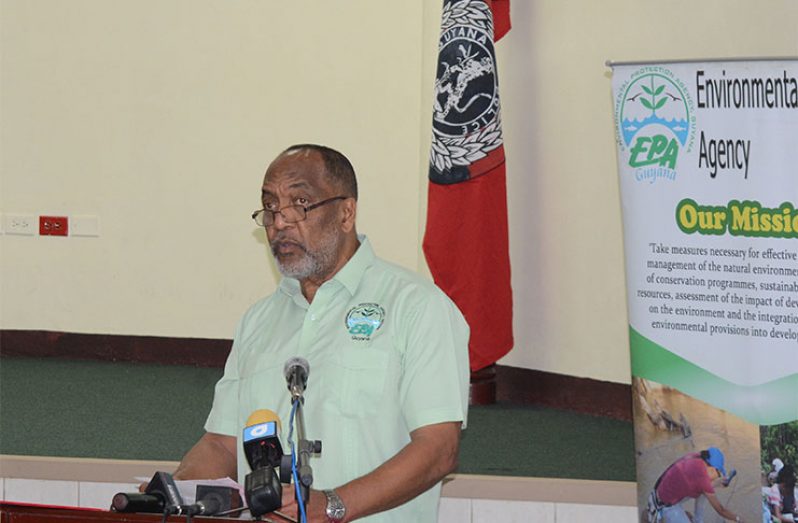– executive director
THE Environmental Protection Agency (EPA) has recorded 156 complaints of noise nuisance last year and some 105 thus far this year, a 35 per cent increase within a period of one year.
EPA Executive Director, Dr. Vincent Adams, made the disclosure on Thursday during an address at a noise management training for police officers at the Police Officers Training Centre, Eve Leary, Georgetown.
“Many people have also stopped complaining because of their perception that they are not getting any responses,” he said.
Cognisant of the impact of noise pollution on the health of human beings and the environment, Dr. Adams said the EPA regulations of 2000 were developed with the framework to manage noise pollution in the environment.
This framework, he said, includes authorisation of facilities that emits noise and adherence to permissible limits and monitoring to ensure compliance.
He said an academic article on the psycho social effects of community noise concluded that school children exposed to elevated noise level had significant decreased attention, social adaptability and increased opposing behaviour in comparison with school children who were not exposed to elevated noise levels.
He said with Guyana’s economic growth unfolding, there will be an increase in the noise pollution, and as such, it must be monitored and contained.
Dr. Adams said access to more finances will ensure that the country has better building, planning and construction to reduce noise pollution while the tools will be available to police those breaking the law.
The EPA, through robust regulatory framework, he said will strengthen institutional capacity; enhance monitoring and enforcement; collaborate through extensive education and awareness aimed at engendering a population that is environmentally conscious.
He said the establishment of the interagency task force on noise nuisance in July 2017 is testimony of work to address and eventually mitigate the problem.
Adding that the development of and strategy to effectively address noise nuisance must be based on proper scientific collection and evaluation of data, Dr. Adams said the training of police will expose them to strategies to collect noise data, using the noise meter and analyse the data obtained.
“This data can be used to address noise nuisance cases and alleviate the discomfort to citizens. Operators of sound-making devices and loud speakers must be compliant with the permissible limit. Police officers equipped with noise meters and trained in their correct use can determine the compliance of the operator,” Dr. Adams said.
He noted that the two-day training with the Guyana Police Force, which is a key partner, must continue.
“I look forward to someday when every officer will be equipped to police noise emissions; no doubt that noise is a big problem in Guyana, the government agencies are working together to address it, but I urge the members of the public to do their part to reduce noise pollution, turn down the volumes, employ sound technology to attenuate the noise emission and implement good management practices to protect yourself and others from the impact of noise pollution,” the EPA executive director advised.



.jpg)








